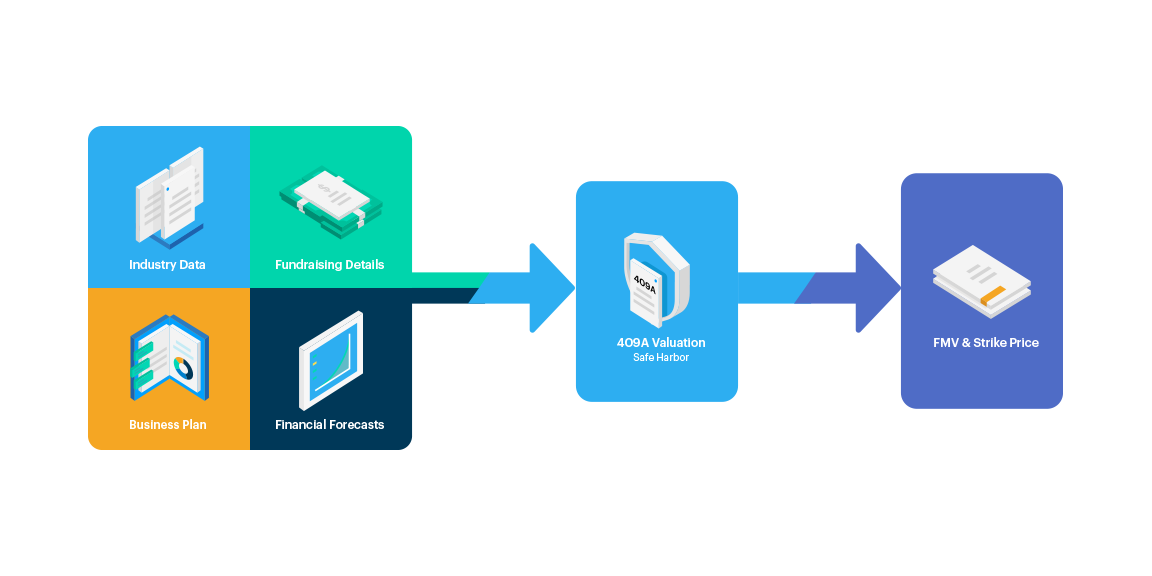
What’s a piece of your company worth? For public companies, that value is set by the market. Private companies, on the other hand, depend on independent appraisers.
Enter the IRS Section 409A valuation. A 409A is an independent appraisal of the fair market value (FMV) of a private company’s common stock, or the stock reserved for founders and employees. This valuation determines the cost to purchase a share.
Long story short: You can’t offer equity without knowing how much a share is worth. So if you want to offer equity, you’ll need a 409A valuation.
We’ll help you understand the basics of the 409A so you can choose a valuation provider with confidence. To see what one looks like, download a sample 409A report below.

Download sample 409A report
What we’ll cover
What are the most common 409A methodologies?
What data do I need to provide to get a 409A?
What are the 409A penalties and who pays?
What is IRC Section 409A?

In response to the 2001 Enron scandal, regulators looked for ways to prevent executives from taking advantage of equity loopholes. The IRS subsequently introduced Section 409A in 2005, later finalizing it in 2009.
The 409A creates a framework for private companies to follow when valuing private stock. When the valuation is conducted by an unaffiliated or independent party, it establishes a safe harbor, meaning the 409A is presumed to be “reasonable” by the IRS—save for a few exceptions.
Valuation isn’t something you take lightly. When your company doesn’t adhere to 409A rules, and the equity is mispriced, the IRS can assess penalties. And who ends up paying? Usually, employees and shareholders—more on that later.
Do I need a 409A valuation?
If you offer equity (or plan to), you need a 409A valuation. Early-stage companies and founders have to keep this in mind to prevent shareholders from having to pay tax penalties that may otherwise be assessed by the IRS.
Here’s a tip: If you’re issuing options as an early-stage firm and you want to take advantage of safe harbor, find a reputable 409A valuation provider. Your 409A needs to be completed before you can issue your first common stock option.
When do I need a 409A?

IRC 409A valuations are valid for a maximum of 12 months after the effective date—or until something called a “material event” occurs. A material event is something that could affect a company’s stock price. For the majority of early-stage startups, a qualified financing is the most commonly encountered material event. A qualified financing typically includes a sale of common shares, preferred equity, or convertible debt to independent, institutional investors at a negotiated price.
Outside of a financing, whether an event is “material” varies case by case. These include acquisitions, divestitures, secondary sales of common stock, business model pivots, and missing or exceeding financial projections. If you aren’t sure, reach out to a 409A valuation provider or consult your lawyer.
To summarize, you should get a 409A valuation:
- Before you issue your first common stock options
- After raising a round of venture financing
- Once every 12 months (or after a material event)
- If you’re approaching an IPO, merger, or acquisition
How much does a 409A cost?
Some providers offer standalone 409A valuations. Others offer bundled services. For standalone valuations, the cost ranges anywhere from $1,000 to over $10,000, depending on the size and complexity of your company.
At Carta, we’ve chosen a different approach. Our annual subscriptions include 409A valuations and cap table management. That means transparent pricing and more efficient valuations.
What is a 409A refresh?
After 12 months (or sooner, if there’s a qualified financing round or material event), your company will need a 409A “refresh” or updated valuation. Any event that may change the valuation of the company means you need a new 409A.
What is 409A safe harbor?
When your 409A is handled in a specific way, it’s eligible for “safe harbor” status. Think of it as peace of mind: A safe harbor valuation is one the IRS presumes to be valid unless they can demonstrate that it’s “grossly unreasonable.”
The IRS provides three safe harbor methods for setting the FMV of private company common shares:
- Independent appraisal presumption
- Binding formula presumption
- Illiquid startup presumption
The most common approach to achieving 409A safe harbor status is using the independent appraisal presumption—or in other words, using a qualified, third-party appraiser.
A 409A valuation is presumed reasonable if the stock was valued within 12 months of the applicable option grant date and no material change has occurred between the valuation date and the grant date. If these requirements are met, the burden is on the IRS to prove the valuation is “grossly unreasonable.”
What are the most common 409A methodologies?
Independent appraisers have an obligation to ensure that your 409A and FMV is “fair” and based on a defensible methodology. There are three standard methodologies providers use during a 409A: the market approach, income approach, and asset approach.
1. Market approach (OPM backsolve)
When your company raises a financing round, valuation providers typically use the OPM backsolve method. It can be safely assumed that new investors paid fair market value for the equity, but investors receive preferred stock. So, adjustments must be made to determine the FMV for common stock.
Other market-based approaches use financial information like revenue, net income, and EBITDA from comparable public companies to estimate the company’s equity value.
2. Income approach
For businesses with sufficient revenue and positive cash flow, valuation providers often use the straightforward income approach. This method defines your company’s FMV as its total assets minus its corresponding liabilities.
3. Asset approach
The asset approach is often used for early-stage companies that haven’t raised money and don’t generate revenue. This methodology calculates a company’s net asset value to determine a proper valuation.
What data do I need to provide to get a 409A?

Once you’ve selected a 409A appraiser, you need to compile and share some important information about your business. As an example, Carta’s requirements are listed below.
Company details
- Name of your CEO
- Name of your external audit firm (if applicable)
- Name of your legal counsel
- Your amended and restated articles of incorporation
Industry information
- Your industry
- A list of relevant and comparable public companies. Most 409A valuations rely on some form of comparison to publicly traded companies.
Fundraising and options
- The most probable timing of a liquidity event
- The number of options you expect to issue in the next 12 months
- Your company presentation, business plan, or executive summary
Company financials
- Financial statements
- Forecasted revenue for the next 12 months, from the valuation date to the next two calendar years
- Forecasted EBITDA for the next 12 months, from the valuation date to the next two calendar years
- Cash burn and runway
- Non-convertible debt amount
Additional details
- Any materially relevant events since your last 409A valuation. If this is your first-ever 409A, share a complete history of relevant events.
What are the 409A penalties and who pays?
When your valuation isn’t performed using one of the approved methods we discussed earlier, you could fall outside of the 409A safe harbor. If penalties are handed out, they can be substantial for employees and shareholders. Penalties include:
- All deferred compensation from the current and preceding years becomes taxable immediately
- Accrued interest on the revised taxable amount
- An additional tax of 20 percent on all deferred compensation
Most startups aren’t likely to be audited by the IRS. That said, as your company grows and you approach an exit (like a merger, acquisition, or IPO), it’s possible you could face IRS audits. You’ll save time and effort by working with a reputable valuation provider from the beginning.
About Carta
At Carta, we provide audit-defensible 409A valuations. We’re the country’s leading cap table management and 409A provider, performing over 5,000 409A valuations each year. We leverage best-in-class software and industry expertise to deliver valuations faster and for less than traditional providers. Reach out today if you have any questions or need a 409A valuation.
JOIN CARTA
Kick off the 409A valuation process today
DISCLOSURE: This publication contains general information only and eShares, Inc. dba Carta, Inc. (“Carta”) is not, by means of this publication, rendering accounting, business, financial, investment, legal, tax, or other professional advice or services. This publication is not a substitute for such professional advice or services nor should it be used as a basis for any decision or action that may affect your business or interests. Before making any decision or taking any action that may affect your business or interests, you should consult a qualified professional advisor. This communication is not intended as a recommendation, offer or solicitation for the purchase or sale of any security. Carta does not assume any liability for reliance on the information provided herein.




